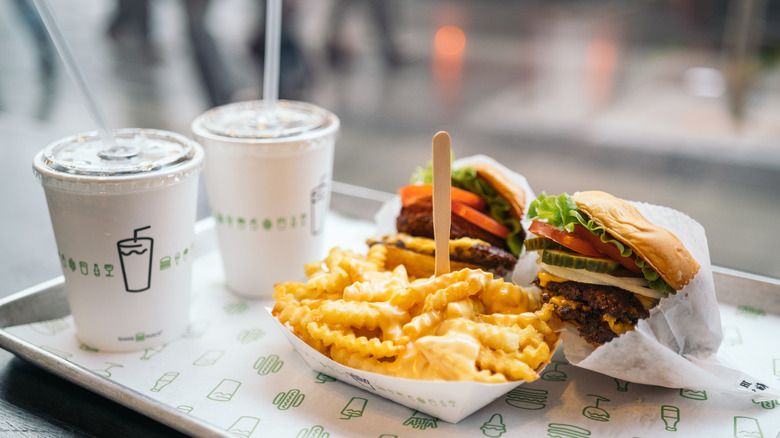Shake Shack Founder Danny Meyer's Advice On When Not To Leave A Tip
To tip or not to tip is a question on many people's minds when they go out to grab food. In the U.S., like it or not, if you are ordering food from and being served by a waitstaff, typically a server, busser, bartender, or more, then it is customary to leave a tip of about 20% of the total amount of the bill for service deemed to be good quality. But what about when you are picking up a takeout order of food or a beverage from a cashier, such as at a fast food restaurant or coffee shop? Shake Shack founder Danny Meyer, the operator of restaurants up and down the culinary spectrum, said "no," during an interview with CNBC.
"If you're just taking out food, and it was just a transaction — I give you money, you give me a cup of coffee — I don't think there's any obligation to tip whatsoever," Meyer told "Squawk Box" hosts Rebecca Quick and Andrew Ross Sorkin.
Meyer's own fast food restaurant, which abolished tipping five years ago before going back, does give customers the option to tip in their point-of-sale system. But Meyer explained that it is nearly even between customers that choose to leave a gratuity for their Shake Shack order and those that do not.
The fraught history of tipping
Tipping has become an integral part of dining culture, particularly in the U.S. However, its history is shrouded in controversy, with varying perspectives on its merits and drawbacks. The practice of tipping traces back to European aristocratic societies, where it was customary to reward servants for exceptional service. In the U.S., tipping gained prominence in the late 19th century when wealthy Americans traveled to Europe and witnessed this tradition.
Despite its prevalence, tipping has attracted criticism from various quarters. One of the main reasons for opposition is the inherent inequity in the system. Tipping often perpetuates a culture where the earnings of food service staff rely heavily on the generosity of customers, leading to inconsistent and unpredictable income. This particularly affects marginalized workers, such as people of color and immigrants, who may face discrimination or receive lower tips due to implicit biases.
While many customers and workers advocate for abolishing tipping, some restaurant owners argue in favor of keeping it intact. For these owners, the tipping system allows them to keep labor costs low and maintain competitive prices. By transferring a significant portion of the staff's wages to customer discretion, they can afford to pay lower base wages, reducing overall labor expenses. This approach helps businesses survive in an industry known for thin profit margins, especially in times of economic uncertainty.

